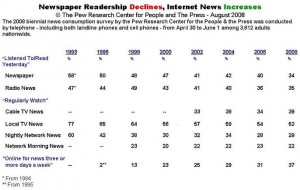a trend that impacts your salary
As this blog is “where the worlds of voice over, marketing and advertising collide” I try and make sure individual posts cover one or more of those areas each week. This post covers all three.
If you earn your living as a voice talent, a marketer (for your own company or on behalf of someone else) or in advertising (either for yourself or someone else) there is a trend developing that you need to think about. Why?
Because it affects how much money you’re going to make in the future. Think mortgage payments, new cars and education.
With me now?
Double click on the chart below and then click back for some thoughts.
That chart is part of a much more in-depth study produced in August, 2008 by the Pew Research Center for People and The Press. Maybe its stuff you thought was happening and maybe it even reflects your personal changes. But this is now quantifiable. And that means a lot to how we all make our livings. Pay attention:
You have just read a 15 year trend in media usage, specifically how people get their news.
* 24% fewer people in that time period get their news from newspapers
* 12% fewer people get their news from the radio
* 31% fewer people watch the nightly network news
* On line and cable news consumption is through the roof
This is about more than just news, I think. This is a game changer for people who work in media (including voice over), marketing and advertising. Most are dealing with this and thousands of pages of similar data already but I’m guessing you may not be, so let us ruminate for a moment, shall we?
Let’s just for the sake of this post take out concerns of the bias of cable news outlets as it affects their presentation of the news to the growing majority of American cable news consumers and how that impacts how people think, act and vote about issues of the day. Great topic and just considering it gets your head to throbbing but back away from it just for this discussion.
Let’s do say you’re a voice talent and you’ve been charging $200 for a :30 second commercial on local broadcast television and $150 or even $100 for cable TV spots because there are fewer viewers. Survey says that number is changing a bit (though broadcast ratings are still higher). Should you consider changing your cable fees? Is that change justified? Survey says maybe.
Let’s say you’re in advertising and you’ve been specializing in print ads which mostly go in newspapers or you’ve been doing lots of radio spots on news talk stations. Shouldn’t you at least reconsider either your primary business services or your media recommendation to clients? Survey says it’s probably worth some brainstorming.
Let’s say you’re in marketing for a grocery store and you do weekly inserts with specials and temporary price reductions and the like. Has coupon redemption gone up or down on those inserts? Any reasons you know of for a change? Survey says maybe.
Let’s say you are a consumer that can be influenced by commercials you see on cable TV, print ads or weekly grocery store inserts (we’d all like to say “not me” but we’d be lying). Could your buying habits be impacted by this change in media usage? After all, you’re the one changing the usage. What if you’re not finding out about all these new special offers because the media vendors haven’t changed their marketing plans for their clients? Clients whose products you normally buy or would consider buying.
The point is not that any of these industries need to play catch up because that’s what we’re all doing everyday anyway. A trend arises and we react. Tuesday go left. Wednesday go right. Thursday is too far away to consider.
The point is to be aware that there are very specific changes in media usage. This information is but one small part.
But do you comprehend the change? Do you even feel it, maybe? Is the change impacting the way you do business? Should it change the way you do business?
Is it impacting the way you buy things? Does it alter your opinion of brands? Could it alter the opinions of consumers of your brand?
That box below here is where the discussion begins…be a part of it, now. Thanks.









